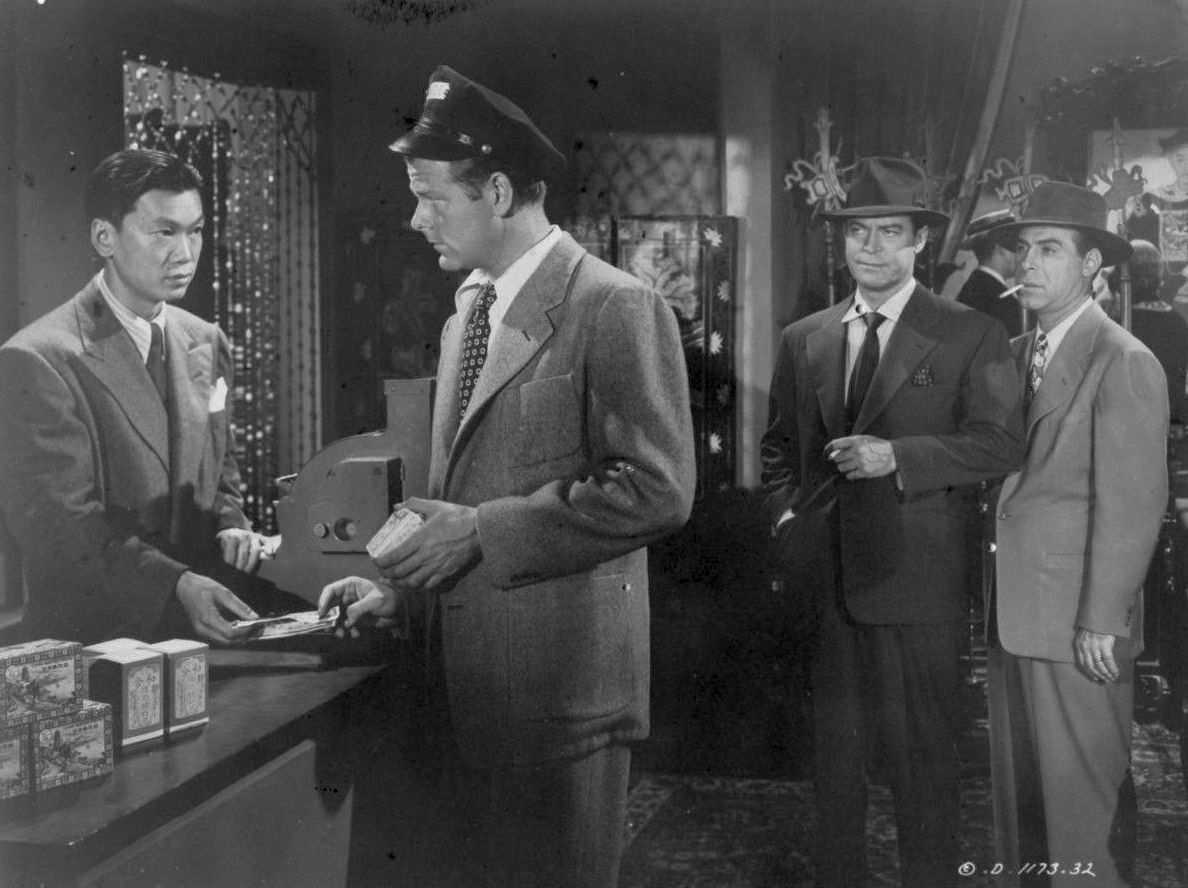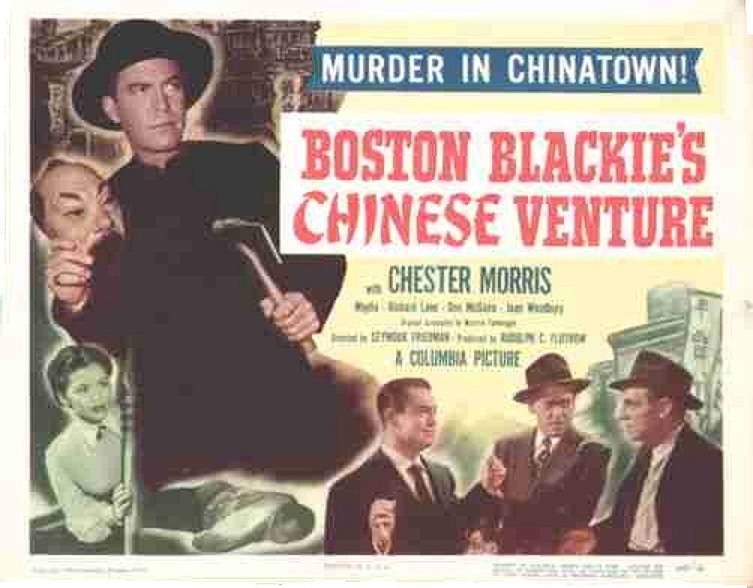Review: Boston Blackie’s Chinese Venture (1949)
Posted by Ivan G. Shreve, Jr. on Feb 25th 2015
No sooner has Horatio “Boston Blackie” Black (Chester Morris) dropped off a bundle of dirty clothes to his laundryman, Charley Wu, when frenemy Inspector Farraday (Richard Lane) wants a few answers to questions surrounding Wu’s murder. It seems that Wu’s niece, Mei Ling (Maylia), spotted Blackie and The Runt (Sid Tomack) leaving the gentleman’s establishment shortly after she discovered Uncle Charley’s corpse. Farraday isn’t completely convinced that Blackie is the murderer, but he’s sure B.B. knows more than he’s willing to reveal. Mei Ling believes Farraday’s not above pinning the rap on Blackie—or even her—just to close the case, though Blackie reassures her the Inspector is “an honest cop.”
And thus, it falls to Blackie and Runt to expend the necessary shoe leather to clear up the matter of Wu’s death. Farraday thinks it might have some connection to the numbers racket, but Blackie soon learns that Charley inadvertently received a package that points toward a Chinatown tour bus racket and, ultimately, stolen jewelry. The jewelry angle is right in Blackie’s line of work as the curtain rings down on the final entry in Columbia Pictures’ movie series based on Jack Boyle’s creation, Boston Blackie’s Chinese Venture (1949). Chinese Venture is one of three Blackie movies that’s been released to MOD DVD by Sony Pictures Video (along with One Mysterious Night and A Close Call for Boston Blackie). That might be your best bet if you haven’t seen the picture; in January, when getTV televised a marathon of Boston Blackie movies, Chinese Venture was curiously not on the schedule.
Chinese Venture is a fitting capper to the long-running franchise, though it can be argued that the story (courtesy of Maurice Tombragel) and direction (Seymour Friedman, who helmed the previous Trapped by Boston Blackie) are aggressively average for a movie that should have exited with a bit more flourish. Unsurprisingly, the final entries in Columbia’s Whistler (The Return of the Whistler) and Crime Doctor series (The Crime Doctor’s Diary) were pretty humdrum as well. But Chinese Venture moves along at a brisk clip (barely an hour’s running time) and shines a spotlight on several first-rate Asian-American actors, including Maylia, Philip Ahn, Benson Fong (a one-time scion of cinematic sleuth Charlie Chan) and Victor Sen Yung (also a member of the Chan clan).

Viewers will also notice that there’s a different actor playing the role of Blackie’s loyal sidekick The Runt; he’s Sid Tomack, a balding character actor who played scores of clerks and cabbies throughout his movie career…though he’s probably better known for playing second-string hoods, the kind of roles Ben Welden would have taken on had Ben not been busy. Tomack can be seen in such films as A Double Life (1947) and Hollow Triumph (1948); one of my favorite Tomack appearances is in Force of Evil (1948), in which he’s uncredited as human calculator “Two-and-Two” Taylor. Sid also performed often on radio; he can be heard on several broadcasts of The Life of Riley (Tomack was playing the role of Jim Gillis in the Jackie Gleason TV version so that John Brown could concentrate on Digby “Digger” O’Dell) and he replaced Brown as “Al” in the waning years of radio’s My Friend Irma. As The Runt, Sid does a respectable job…but he just couldn’t convey the rat-like quality that was the bailiwick of George E. Stone.
Columbia contractee Joan Woodbury plays the femme fatale in Chinese Venture (known simply as “Red”); we’ve mentioned her appearances in Confessions of Boston Blackie (1941) and The Whistler (1944) on the blog, and she’s also familiar to serial fans as the titular Brenda Starr, Reporter (1945). Another familiar cliffhanger face appears in Chinese Venture as well: Don McGuire as Les the bus driver. McGuire brought the comic strip character of Congo Bill to life in 1948 and appeared in such films as The Threat (1949) and Armored Car Robbery (1950). He later became a director-producer, overseeing features such as Johnny Concho (1956) and Jerry Lewis’ first solo outing, The Delicate Delinquent (1957).

We here at Radio Spirits hope you’ve enjoyed our retrospective of Columbia’s Boston Blackie franchise, and highly recommend these entertaining mystery comedies to anyone who’s a fan of classic movies. Radio Spirits also reminds you that we have TV’s Boston Blackie on hand in a DVD featuring four of his boob tube adventures, as well as classic Blackie broadcasts on Outside the Law and Great Radio Detectives (“Kingston and the Disappearing Office Building”).

